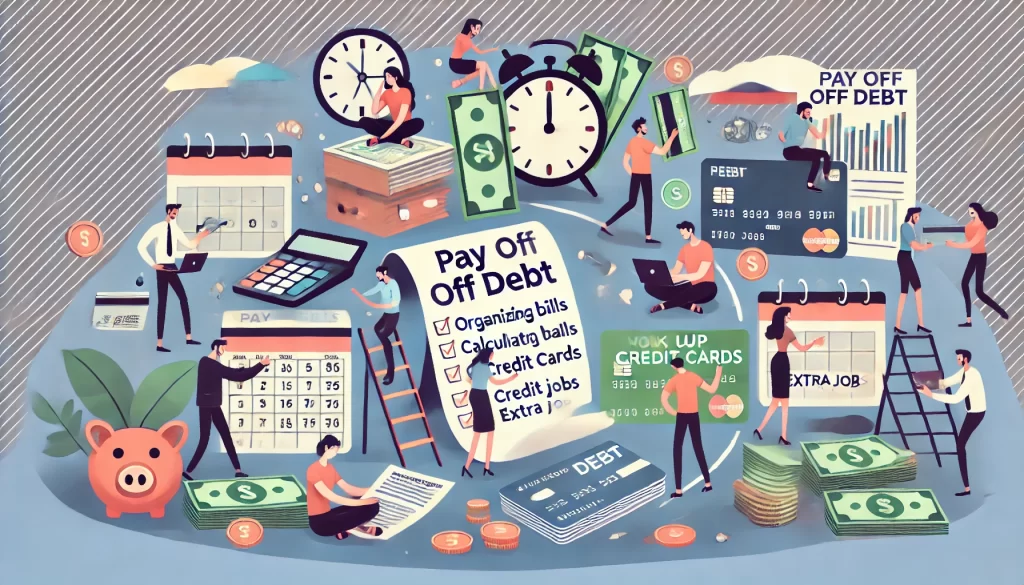We’ve all felt the crisp freshness of a new dollar bill, full of possibilities. But for many Americans, debt makes that feeling fade away. The average debt balance in the U.S. is $96,371, making achieving financial freedom seem out of reach.
Managing our earnings and debts is like walking a tightrope. Even with a $55,800 average salary, debt can make every step uncertain. Effective debt elimination methods can be our guide back to stability.
The path to efficiently tackling debt is full of tough choices. Nyajuok Mangongo budgeted $100 a month to clear $87,000 of credit card debt. The Lacys focused on their smallest debt first and paid off $21,000 in less than two years. Their stories show discipline and determination.
Understanding our financial tools is key to getting ahead. The Citi Simplicity® Card and personal loans from LightStream can help. But we must know the terms to use them wisely.
We can break the debt cycle. Whether you like the debt snowball or debt avalanche method, there’s a strategy for you. Keeping your credit utilization ratio below 30% is also crucial for your credit score.
Every financial situation is different. The journey to pay off debt may vary, but the goal is clear: to live without debt’s burden. Our aim is to master debt, live freely, and seize opportunities.
Understanding Your Debt Situation
Before you start managing your debt, it’s key to ascertain your total debt balance. Knowing what you owe across all accounts helps you make a solid plan to get back on track. Each debt affects your finances differently, mainly because of varying interest rates.
Assessing Your Total Debt
Look over every loan and credit line to make a full list of your debts. Note the amount owed, along with interest rates and how long you have to pay. Knowing these details is crucial for planning how to pay off your debt.
Identifying High-Interest Debts and Payment Due Dates
To manage high-interest debt, find the loans or credit cards with the highest rates first. These often increase your debt quickly. Focusing on these debts first can reduce the interest you pay. Also, track payment deadlines for each account to stay on schedule. Missing deadlines can slow your progress and add extra fees to your debt.
Use tools or reminders to make sure you pay on time. For more tips on avoiding high fees and smart credit use, check out this informative article. It offers great advice and alternatives.
With a clear understanding of your debts, especially the high-interest ones, you can create a better repayment plan. This plan will help you tackle your immediate financial issues and improve your financial health over time.
Creating a Sustainable Budget
The first step to financial freedom is making a sustainable budget. It’s about matching your spending with your income. Look closely at every bill and purchase to grow your money, not just spend it.
Cutting Unnecessary Spending
To cut down on spending, sort your expenses into ‘needs’ and ‘wants’. Big areas like housing, transportation, and food can be trimmed. Check your monthly bills for savings, like on car insurance.
Also, think before buying something on impulse. Simple actions like walking instead of shopping can help you save money without missing out.
Increasing Income Through Side Jobs or Selling Unwanted Items
Boost your income with part-time jobs or selling things you don’t need. The gig economy offers many chances, like tutoring or pet sitting. Selling items you no longer use can also help.
This mix of spending less and earning more can fast-track your debt elimination.
Creating a budget is not about cutting back. It’s about making smart choices for your financial future. Sticking to your budget is like sticking with a workout plan. Both require effort but bring great rewards.
How to Pay Off Debt Quickly
Many people aim for financial freedom by finding ways to pay off debt fast. A key step is to tackle debts with the highest interest rates first. This way, you stop more money from being lost to interest.
To reduce debt efficiently, it’s not just about paying more each month. Using smart financial tools also helps. For example, balance transfer credit cards with 0% interest can save you a lot. They let you pay more towards the principal, not just the interest.
A good financial freedom plan also means how you handle your money every day. Using cash or debit instead of credit cards can help avoid new debts. Making your monthly bills cheaper, like by negotiating with service providers, also gives you more money for debt.
Reduce debt efficiently by using extra money, like bonuses or tax refunds, for your debts. Seeing your debt go down can motivate you to keep going. It turns debt repayment into an exciting challenge.
There’s no single way to manage money that works for everyone. But these tips can be adjusted for your own situation. They can help you reach financial freedom more easily.
Strategies for Accelerating Debt Repayment
Dealing with debt can feel like a heavy load, but there are ways to make it easier. Using debt repayment tricks and clear strategies can help. This makes managing your debts simpler and less scary.
Debt Snowball vs. Debt Avalanche Methods
The debt snowball method starts with the smallest debts first. As you pay them off, you get a sense of achievement. This keeps you motivated to keep going.
The debt avalanche method targets debts with the highest interest rates first. This can save you money by cutting down on interest costs.
Considerations for Debt Consolidation
Debt consolidation can be a big help in paying off debt. You can use 0% balance transfer credit cards or home equity lines of credit. This combines your debts into one with lower interest rates. It makes managing your payments easier and can save you money on interest.
Benefits of Extra Payments Towards Principal
Paying more towards your principal can really speed up debt repayment. For instance, paying more on a high-interest credit card can reduce the time it takes to pay off the debt. Over time, these extra payments can greatly reduce your debt and help you achieve financial freedom faster.
In conclusion, there’s no single best way to pay off debt. Using different strategies like the debt avalanche or snowball methods, consolidating debts, and making extra payments can all help. Each method works best in different financial situations. Consider your own situation to find the best way to pay off your debt faster.
Conclusion
Starting the journey to a debt-free life is a big step that needs hard work, careful planning, and knowing how to pay off debt well. Many Australian families struggle with debt, showing how important it is to manage it well. Whether it’s paying off student loans or dealing with high credit card interest, people everywhere want to get out of debt fast.
Using strategies like the debt avalanche method or debt consolidation can save money and make paying back easier. Making lifestyle changes and budgeting better—like renting out a spare room or using unexpected money to pay off debt—can also help. These smart choices and tailored plans help people pay off debt faster.
To wrap up, making smart financial choices and sticking to a repayment plan is key to a secure financial future. This advice helps everyone, from Australians buying a new car to people worldwide dealing with credit card debt. By looking at your finances, making a solid budget, and sticking to a repayment plan, becoming debt-free is possible. With better financial knowledge and applying these strategies, we can beat debt and look forward to a stable and worry-free future.






